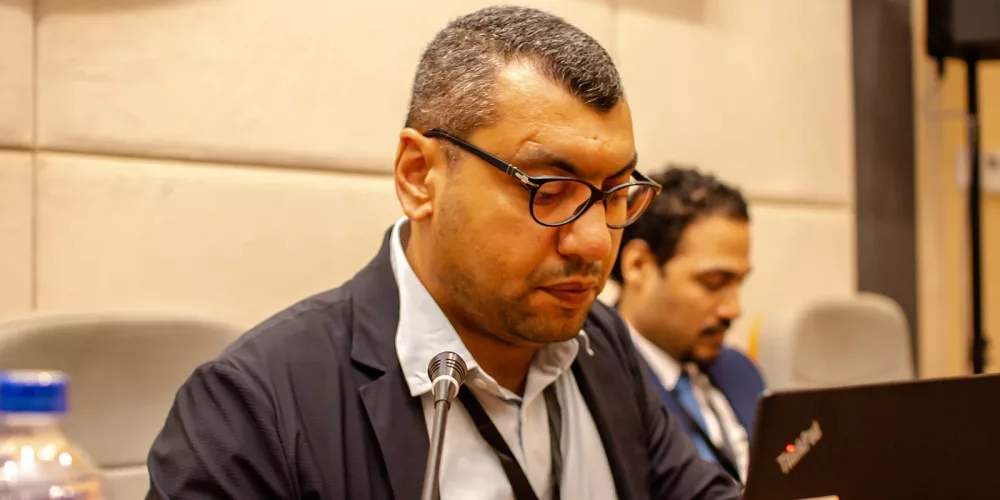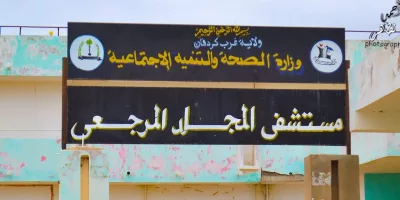The Committee for Justice (CFJ) has organized a side event within the framework of its “Country Review” project, focusing on the human rights situation in Egypt, on Saturday, May 3rd, at 4 PM, at the Sir Dawda Kairaba Baba Jallow International Conference Center in Banjul, The Gambia. The event covers the period from the end of the previous session of the African Commission on Human and Peoples’ Rights to the current session, shedding light on the most important events, violations, and changes that affect the human rights scene in Egypt, whether through intensification of crises or emergence of signs of progress.
– Freedom of Expression Under Attack in Egypt:
At the beginning of the event, Ahmed Mefreh, Executive Director of The CFJ, states that tens of thousands remain in detention in Egypt; many journalists, activists, lawyers, and ordinary citizens are still held without trial on vague charges.
Mefreh adds that freedom of expression is under attack in Egypt, the judiciary is losing its independence, and case recycling is being used as a tactic to keep detainees imprisoned.
– National Dialogue and the Criminal Procedure Law:
Ahmed Atallah, Director of the Egyptian Front for Human Rights, speaks about the persecution of human rights defenders and the violations they face, pointing out flaws in the national dialogue and how the state uses it for propaganda purposes to suggest an improvement in the human rights situation in the country.
He says: “Despite the establishment of new prisons in Egypt as part of a strategy to improve detention conditions, human rights organizations document numerous violations inside these new facilities.”
Atallah refers to the draft criminal procedure law, stating: “This bill undermines several human rights principles, such as the right to defense and entrenches the trial of civilians before military courts. Authorities amend the Public Facilities Law by replacing fines with life imprisonment.”
Regarding the National Dialogue and the Presidential Clemency Committee, he notes: “The work of the Presidential Clemency Committee has been marked by significant delay and insufficiency. After two years, only 2,500 individuals detained in opinion-related cases are released, while 6,800 citizens are arrested during the same period by State Security Prosecutions!”
– Conditions Inside Egyptian Prisons:
Mohamed Lotfy, Director of the Egyptian Commission for Rights and Freedoms, states during his speech at the event that “prison conditions in Egypt are extremely difficult, contrary to what the Egyptian government promotes. All prisons, old and new, are under the control of National Security officers who deprive political prisoners of medical care and family visits, leading to several suicide cases.”
Lotfy adds: “Many political detainees exceed the legal pre-trial detention period in Egypt, and even those released are charged in new cases with the same accusations!”
He concludes by emphasizing the need to raise alarm over the tragedies occurring inside Egyptian prisons, especially Tora Prison, where prisoners begin to show resistance against the conditions they live in. He urges African mechanisms to stress that some basic measures—such as allowing family visits, enabling judges to legally review cases, and revising detention laws—can give prisoners hope that something remains worth holding onto.
– A Clear Pattern of Retaliation Against Workers:
Usame Mehmetoglu, UN and Regional Communication Officer at Committee for Justice, focuses on issues related to the new labor law, which tightens restrictions and keeps workers under the control of employers and the state. Instead of improving working conditions, the law prevents workers from expressing their views, organizing themselves, or going on strike. The law makes the right to strike extremely difficult—it requires submitting requests, obtaining prior approval, waiting long periods, and requests are often ignored or deliberately delayed.
Oglu adds: “The new law restricts the formation of trade unions by making the registration process excessively complicated. It gives authorities the power to reject or revoke union licenses based on vague reasons—or even without providing any reason at all.”
He continues: “The problem goes beyond legal drafting. We observe a clear pattern of retaliation against workers who attempt to defend their rights, which constitutes a violation of Egypt’s obligations under regional and international law. Therefore, there is a need to continue amplifying workers’ voices and provide them with real protection.”






